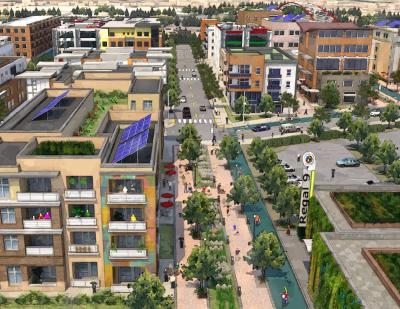Vertical Housing Development Zone
Tax Abatement Incentive for Mixed-use Projects
A Vertical Housing Development Zone (VHDZ) offers a partial property tax exemption on building improvement value for developments that include housing with non-residential use on the ground floor, with the amount of tax exemption increasing based on the size and composition of the project. (In most cases this means 20%* abatement, per floor of residential use above the ground floor.) The abatement period for an eligible project is 10 years.
*An additional abatement on land value may be available for low-income housing projects.
Download Application Materials
Application Form (Fillable PDF)
Exemption Calculator (Excel File)
Adoption
Two recent planning processes, the Town Center Plan (2019) and Equitable Housing Strategic Plan (2020), identified the use of VHDZ as a tool to incentivize multi-story, mixed-use development in Town Center and the Villebois Village Center.
Throughout 2021, City Council explored where and how to implement this program in Town Center and the Villebois Village Center. City Council adopted Resolution No. 2971 - Establishing the Wilsonville Vertical Housing Development Zone (VHDZ) Program and Local Criteria at their regular meeting on May 2, 2022.
Project Eligibility
Rules governing all VHDZ programs in the State of Oregon can be found in Oregon Revised Statutes § 307.841 to 307.867. These include baseline project certification requirements, found in § 307.858. Briefly:
- A project must be located entirely within a designated VHDZ boundary.
- At least 50 percent of the project's ground floor that fronts on the primary public street must be committed to nonresidential use.
- For the project's ground floor to be considered committed to nonresidential use, all ground floor interior spaces that front on the primary public street must be constructed to building code standards for commercial use or planned for commercial use upon completion.
- The amount of the exemption is computed using methodology described in ORS 307.857.
- The project must have an "exemption multiplier" of at least 1.0, as computed under ORS 307.857(4)(b) or (c).
Local Criteria
(1) In addition to the project certification requirements under ORS 307.858 related to ground floor nonresidential use, the following criteria apply to ground floor interior spaces intended to qualify as nonresidential use:
- Direct street access required: Each space must have a direct entrance to/from the primary public street.
- Commercial/mixed-use design required for ground floor: The ground floor must meet all applicable design standards for commercial/mixed-use ground floor spaces and any applicable architectural standards related to commercial/mixed use buildings and storefront design.
- Design of live/work space: The nonresidential area of ground-floor spaces that meet building code requirements for live/work units may qualify as a nonresidential use, provided the following criteria are met:
- The nonresidential area is adjacent to and accessible from the entrance to the primary public street.
- The nonresidential area is or can be separated from the residential area (e.g., with walls, half-walls, different levels, etc.).
- Commercial or community-serving space required: Each building must include at least one (1) nonresidential space that fronts the primary public street and meets one of the following criteria:
- Commercial space designed for use by an entity engaged in the exchange of goods or services with the public, excluding live/work space.
- Community-serving space that provides access and benefits to the broader community beyond building residents and their guests.
(2) The project must demonstrate consistency with the applicable goals, policies, and/or objectives in adopted Master Plans for the project site, to the City's satisfaction.
To learn more or apply:
Contact Economic Development staff—contact info noted in the right-hand column of this page.
Note: for a project to be eligible for the VHDZ program and associated tax abatement, the project must be certified by the City of Wilsonville BEFORE the issuance of a certificate of occupancy.





